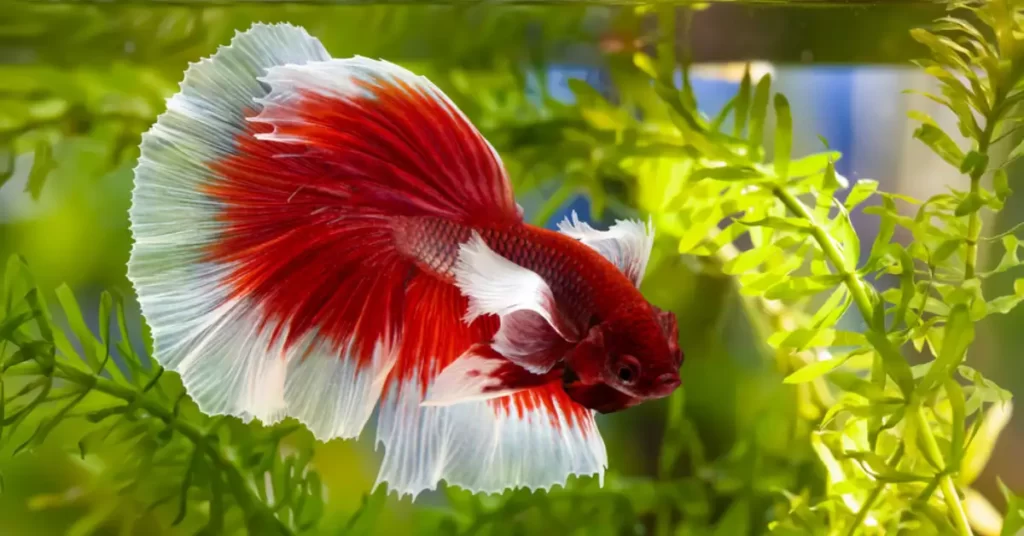Betta fish, also known as Siamese fighting fish, are popular pets due to their vibrant colors and unique personalities.
If you’re considering getting a betta fish, one of the questions you might have is whether they can live in cold water.
In this article, we’ll explore betta fish’s natural habitat, temperature preferences, and the impact of water temperature on their health.
We’ll also discuss ways to maintain the ideal temperature for betta fish and some frequently asked questions.
So, let’s dive in and learn more about these beautiful creatures and their water temperature requirements!
Understanding Betta Fish Natural Habitat
The Origins of Betta Fish
Betta fish are native to Southeast Asia, primarily found in countries like Thailand, Vietnam, Cambodia, and Laos.
They inhabit shallow, slow-moving waters such as rice paddies, ponds, and swamps. The natural environment of betta fish plays a significant role in understanding their temperature preferences.
The Climate of Southeast Asia
The climate in Southeast Asia is typically warm and tropical. The average temperature ranges from 75°F (24°C) to 86°F (30°C) year-round.
In this region, the water temperature also remains relatively warm, creating a suitable environment for betta fish to thrive.
The Ideal Water Temperature for Betta Fish
Preferred Temperature Range
Betta fish prefer water temperatures between 76°F (24°C) and 82°F (28°C). This range aligns with the temperatures of their natural habitat.
Maintaining a stable water temperature within this range is crucial for the health and well-being of betta fish.
The Impact of Cold Water on Betta Fish
Betta fish are tropical fish, and their metabolism and bodily functions are adapted to warm water conditions. When exposed to cold water, several issues may arise:
Slowed Metabolism: In cold water, a betta fish’s metabolism slows down, leading to lethargy, reduced appetite, and impaired digestion.
Weakened Immune System: Cold water weakens a betta fish’s immune system, making them more susceptible to diseases and infections.
Stress: Fluctuations in water temperature can cause stress, which can result in a decrease in a betta fish’s overall health and color vibrancy.

Tips for Maintaining Ideal Water Temperature
Aquarium Heaters
One of the most effective ways to maintain a consistent water temperature in your betta fish tank is to use an aquarium heater.
Submersible heaters are a popular choice because they can be easily adjusted and monitored. It’s important to choose a heater that is suitable for the size of your aquarium.
Monitoring Water Temperature
Invest in a reliable aquarium thermometer to monitor the water temperature regularly. By doing so, you can ensure that the temperature remains within the ideal range and make any necessary adjustments.
Insulating the Aquarium
Aquarium insulation can help maintain a consistent water temperature by reducing heat loss. This can be achieved by placing the aquarium in a well-insulated room or using an aquarium cover.
Additional Tips for Betta Fish Care
Proper Tank Size and Filtration
Choose a tank that is at least 5 gallons in size, as smaller tanks can lead to rapid temperature fluctuations and poor water quality.
Additionally, a proper filtration system is essential to keep the water clean and free of harmful toxins.
Regular Water Changes
Perform regular water changes to maintain optimal water quality. Replace 20-25% of the water in the tank once a week with treated, dechlorinated water at the correct temperature.
This helps to maintain stable water parameters and temperature.
Providing a Balanced Diet
Feed your betta fish a varied and balanced diet that includes high-quality betta pellets, and frozen or live foods such as brine shrimp, bloodworms, and daphnia.
Feeding a proper diet helps to keep your betta fish healthy and strengthens their immune system.
Monitoring Your Betta Fish’s Health
Keep an eye on your betta fish’s behavior, appearance, and activity levels. Signs of illness include lethargy, loss of appetite, bloating, and discolored or clamped fins.
If you notice any of these symptoms, take action to identify and address the issue promptly.
Frequently Asked Questions
Can betta fish survive in room-temperature water?
Room temperature water is usually not warm enough for betta fish, especially during colder seasons.
It’s essential to maintain the water temperature within the ideal range for the health and well-being of your betta fish.
How long can betta fish survive in cold water?
While betta fish can survive in cold water for short periods, prolonged exposure to cold water can lead to health issues and a weakened immune system.
It’s crucial to maintain an appropriate water temperature to ensure the long-term health of your betta fish.
Can I use a heating pad to warm my betta fish tank?
Using a heating pad is not recommended for warming a betta fish tank, as it does not provide even and consistent heat distribution.
Instead, opt for a submersible aquarium heater designed specifically for maintaining the ideal water temperature in fish tanks.
Conclusion
Betta fish are tropical creatures that thrive in warm water conditions. Cold water can negatively impact their metabolism, immune system, and overall health.
It’s essential to maintain a stable water temperature within the ideal range of 76°F (24°C) to 82°F (28°C) to ensure the well-being of your betta fish.
By following the tips provided in this article, you can create a comfortable and healthy environment for your betta fish to live and thrive.